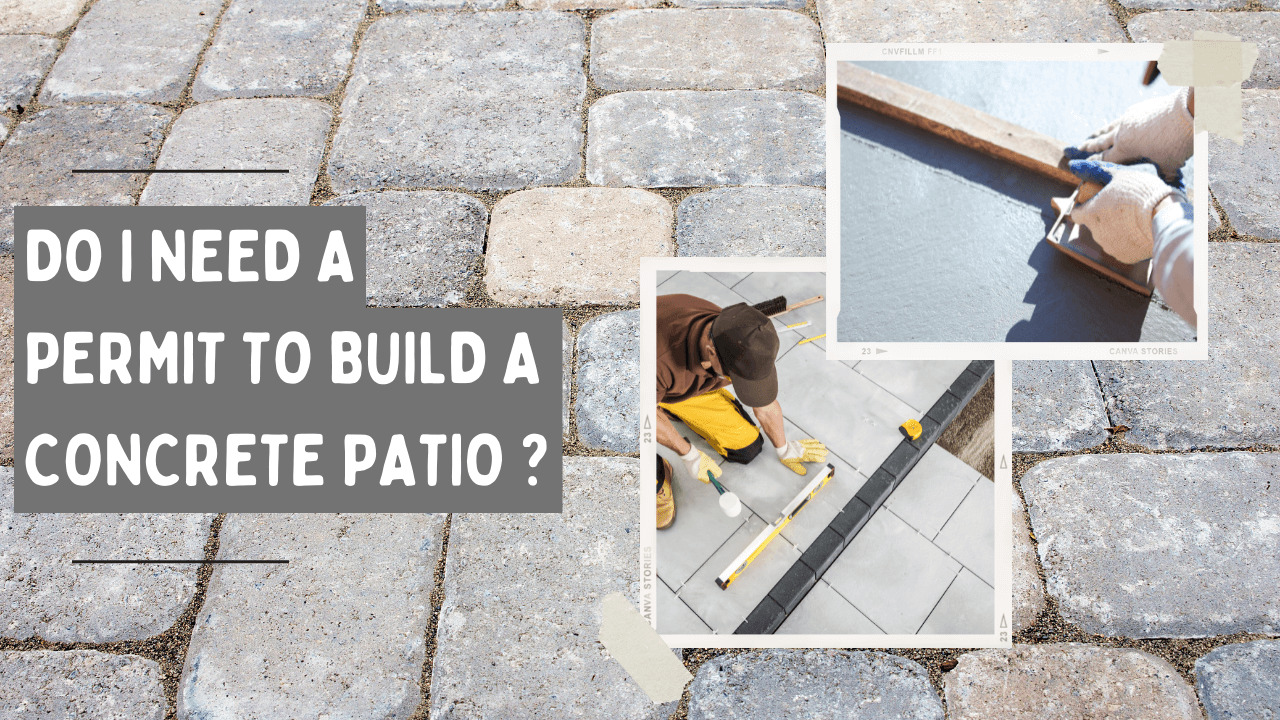Building an on-grade patio out of concrete, brick, or other material does not always require a permit. Local governments have a wide range of requirements, from liberal to strict. Individuals must seek permission before beginning any construction project, regardless of the amount of concrete or the size of the structure.
This is to notify local officials about whatever you’re building. The good news is that many concrete projects at or near grade level won’t require a permit. One issue with pouring concrete in your backyard without first obtaining the proper licenses is that local authorities will eventually find out, and you will be punished significantly.
You have to focus on a few facts and considerations before building a concrete patio in your backyard. So, continue reading to know all about it in detail;
Table of Contents
Patio’s Height Matters
The majority of jurisdictions distinguish between on-grade and elevated structures. In different localities, the height considered above grade varies greatly. In some circumstances, permission may be necessary if the size limit is exceeded.
Another exception is where the zone has development restrictions, such as an environmental protection zone or concerns about the excavation.
Is your concrete patio less than thirty inches or above ground level? If that’s the case, luckily! You won’t require a construction permit. However, your concrete contractor may need to obtain excavation permission.
Rules Vary According To Each Country And Location
Adding a concrete patio is a difficult option because the answer varies depending on where you live. When restoring or creating your backyard, many individuals believe that hiring a contractor is all that is required.
This does not appear to be the case. Knowing the rules that govern your construction project is just as crucial as hiring a contractor.
You might think that your contractor will handle any required permits, but as a building owner, you should be aware of all aspects of the construction process. You should generally check with local authorities before beginning any construction job, including pouring concrete in your backyard to rebuild it.
Patio’s Structure Also Matters
A permit is usually required for structural changes to the house. If the patio is enclosed or covered, a permit will almost certainly be required. This would include putting in a door that leads to the patio.
A permit is not required to replace a door while using an existing aperture. It’s possible that adding provisions for patio lights will necessitate obtaining an electrical permit. A permit is required depending on the size of the area you wish to pour concrete over.
A license is required if the area is more than 200 square feet. You may also require a permit to pour concrete in your backyard if you live in a town with development limitations, such as an environmental protection zone.
With A Proper Building Plan, No One Will Stop Pouring Concrete On Patio
Nothing can stop you from pouring concrete in your backyard to make a gorgeous patio if you have a good building plan, a good contractor, and a permit. If your concern is the earth or soil in your backyard, you do not need to be concerned.
A well-planned pouring process can be used to pour concrete over the earth. Concrete is a classic, adaptable, and attractive material in any backyard design. It may be molded and cast into any shape you like.
You can also tint it to make it any color you want if you don’t want a traditional grey color. Concrete floors are also long-lasting, robust, inexpensive, and simple to maintain.
What Are The Consequences Of Pouring Concrete On Patio Without A Permit?
If the concrete backyard you’re constructing requires a permit and you didn’t get one, or if your contractor skipped the process, you’ll face penalties vary by state. A severe punishment, citation, and the purchase of retroactive permission are among the possible consequences.
It could also make financing, insuring, and reselling your building more difficult. On the other hand, these permits are not intended to make you unhappy or to completely thwart your efforts to build the home of your dreams.
They’re in place because when people don’t follow building protocols, accidents occur, putting the lives of occupants and neighbors in jeopardy.
What Is The Importance Of Getting Permit Before Building A Concrete Patio?
By getting a permit, you can assure that your structure is constructed in the proper area and that your plan is ecologically friendly, comfortable, and does not negatively impact your neighbor.
It is also necessary to obtain evacuation permission while creating a concrete backyard to avoid digging in an area with underground cables and pipes.
Consider excavating an area where electrical cables are buried. It’s dangerous, risky, and potentially fatal. The purpose of the area determines whether or not concrete should be poured close to the property border. You can pour concrete in your backyard only for a walkway.
Final Thoughts
Although it may appear that obtaining a permit for your concrete backyard is needless, complicated, and time-consuming, it is not your responsibility to assess whether the building in your backyard requires a permit.
As a result, verify with the local authorities to confirm your contractor has gotten one before you begin remodeling. It is harmful to disregard the need for permission, no matter how inconvenient it may be.





